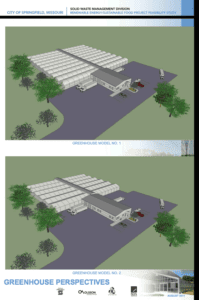Sep 10, 2018Missouri town pursues ‘community greenhouse’
One town in southeast Missouri is asking for proposals to build a greenhouse in a proposed agriculture park.
The Springfield City Council received an update in June on revised plans for a community greenhouse operation, to be powered by renewable energy generated by the Noble Hill Landfill Renewable Energy Center, adjacent to the City’s Landfill, according to a news release from the city.


A feasibility study of the project years ago indicated that the Energy Center produces enough waste heat to potentially support a four-acre commercial greenhouse operation. The city hopes to utilize the waste heat and buffer land in a smart, innovative way that creates jobs, educational opportunities, and economic growth for the community.
The Energy Center was developed in 2006 by the City and City Utilities of Springfield to convert captured methane gas into electricity. With the use of two engines, the captured methane gas is used to generate approximately 3.2 Megawatts of renewable electricity, enough to power approximately 2,100 homes.
As a byproduct of the Noble Hill Landfill Renewable Energy Center, the facility creates an estimated 14 million Btu/hr of thermal waste heat energy generated by the engines. In addition, the City owns approximately 50 acres of land adjacent to the Noble Hill Landfill Renewable Energy Center which is currently being used as a buffer to the Landfill.
Following interest from potential partners, including local growers, educational institutions, local markets, non-profits, and private businesses, the City has modified a previously-released request for proposal (RFP) soliciting proposals to lease the City property adjacent to the Renewable Energy Center and construct a facility to utilize the waste heat.
The modified RFP encompasses input received from growers, community leaders and future partners over the last several years and allows an adequate 120 days for proposal submittal. The updated RFP also requires proposals to meet seven specific project goals:
- Utilize the waste heat
- Produce fresh, local produce
- Provide education and job training resources
- Serve as a resource for local food pantries
- Provide local job development
- Provide satisfactory infrastructure terms
- Provide innovative community benefits
No tax money is included in the funding of this project.














